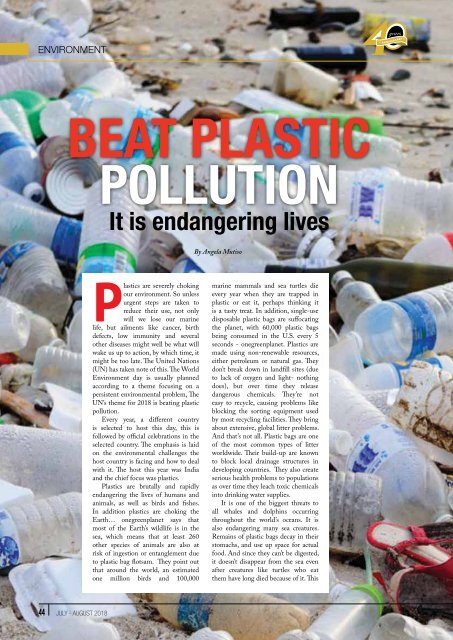The-Accountant-July-Aug-2018
Create successful ePaper yourself
Turn your PDF publications into a flip-book with our unique Google optimized e-Paper software.
ENVIRONMENT<br />
BEAT PLASTIC<br />
POLLUTION<br />
It is endangering lives<br />
By Angela Mutiso<br />
Plastics are severely choking<br />
our environment. So unless<br />
urgent steps are taken to<br />
reduce their use, not only<br />
will we lose our marine<br />
life, but ailments like cancer, birth<br />
defects, low immunity and several<br />
other diseases might well be what will<br />
wake us up to action, by which time, it<br />
might be too late. <strong>The</strong> United Nations<br />
(UN) has taken note of this. <strong>The</strong> World<br />
Environment day is usually planned<br />
according to a theme focusing on a<br />
persistent environmental problem, <strong>The</strong><br />
UN’s theme for <strong>2018</strong> is beating plastic<br />
pollution.<br />
Every year, a different country<br />
is selected to host this day, this is<br />
followed by official celebrations in the<br />
selected country. <strong>The</strong> emphasis is laid<br />
on the environmental challenges the<br />
host country is facing and how to deal<br />
with it. <strong>The</strong> host this year was India<br />
and the chief focus was plastics.<br />
Plastics are brutally and rapidly<br />
endangering the lives of humans and<br />
animals, as well as birds and fishes.<br />
In addition plastics are choking the<br />
Earth… onegreenplanet says that<br />
most of the Earth’s wildlife is in the<br />
sea, which means that at least 260<br />
other species of animals are also at<br />
risk of ingestion or entanglement due<br />
to plastic bag flotsam. <strong>The</strong>y point out<br />
that around the world, an estimated<br />
one million birds and 100,000<br />
marine mammals and sea turtles die<br />
every year when they are trapped in<br />
plastic or eat it, perhaps thinking it<br />
is a tasty treat. In addition, single-use<br />
disposable plastic bags are suffocating<br />
the planet, with 60,000 plastic bags<br />
being consumed in the U.S. every 5<br />
seconds - onegreenplanet. Plastics are<br />
made using non-renewable resources,<br />
either petroleum or natural gas. <strong>The</strong>y<br />
don’t break down in landfill sites (due<br />
to lack of oxygen and light- nothing<br />
does), but over time they release<br />
dangerous chemicals. <strong>The</strong>y’re not<br />
easy to recycle, causing problems like<br />
blocking the sorting equipment used<br />
by most recycling facilities. <strong>The</strong>y bring<br />
about extensive, global litter problems.<br />
And that’s not all. Plastic bags are one<br />
of the most common types of litter<br />
worldwide. <strong>The</strong>ir build-up are known<br />
to block local drainage structures in<br />
developing countries. <strong>The</strong>y also create<br />
serious health problems to populations<br />
as over time they leach toxic chemicals<br />
into drinking water supplies.<br />
It is one of the biggest threats to<br />
all whales and dolphins occurring<br />
throughout the world’s oceans. It is<br />
also endangering many sea creatures.<br />
Remains of plastic bags decay in their<br />
stomachs, and use up space for actual<br />
food. And since they can’t be digested,<br />
it doesn’t disappear from the sea even<br />
after creatures like turtles who eat<br />
them have long died because of it. This<br />
44 JULY - AUGUST <strong>2018</strong>

















